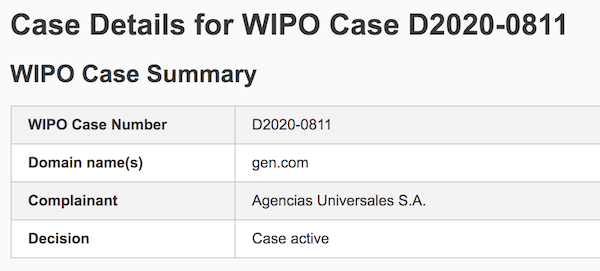
A UDRP was filed against the high value Gen.com domain name. The UDRP was filed at the World Intellectual Property Organization (WIPO). This UDRP is WIPO case #D2020-0811. I spotted the UDRP filing on UDRPSearch.com.
Gen.com was registered exactly 24 years ago today, on April 6, 1996. The domain name is registered under Whois privacy at Network Solutions, and it has been registered privately for quite some time. When I visited the domain name today, it did not resolve to an active website. The last archived screenshot on DomainTools was from 2008 when it was used by an entity called Global Education Network. You can also see how the website looked on Archive.org.
The UDRP was filed by an entity called Agencias Universales S.A. A bit of sleuthing combined with a DomainTools search showed me that this company appears to own the Gen.cl domain name (.cl is the ccTLD for the country of Chile). You can see more about the connection between the complainant and Gen within the company’s website.
Three letter .com domain names hold substantial value, and I would consider Gen.com to be on the higher end of the valuation scale for LLL.com domain names. This list of recent 3 letter .com sales on Embrace.com shows the potential value of Gen.com. As I mentioned in my article about the PRU.com UDRP, data from UDRP.Tools shows that nearly all recent UDRPs filed against 3 letter .com domain names have ended with the domain registrant winning and keeping the domain name. Quite a few have ended in a Reverse Domain Name Hijacking (RDNH) finding.
Not only is the term “gen” commonly used as an abbreviation for the word “generation,” there are also a whole lot of companies that use the GEN acronym. When I did a Google search for “gen,” the complainant’s gen.cl website did not even show for me in the top 100 results. Finally, a different DomainTools search shows there are 305 domain registrations in various TLDs for the “gen” keyword alone.
In order to prevail in the UDRP, the complainant will need to prove that the domain name is confusingly similar to its mark. It must also prove that the domain name was registered and is being used in bad faith. Unless I am missing something, I do not see anything that shows the domain name was registered and is being used in bad faith. I would not be surprised to see a RDNH decision. I will keep an eye out for the decision.
Update: The panel ruled in favor of the domain registrant and also ruled that this was Reverse Domain Name Hijacking.


If sanity and a sliver of decency prevail then RDNH. Mere decision in favor of registrant would be neither.